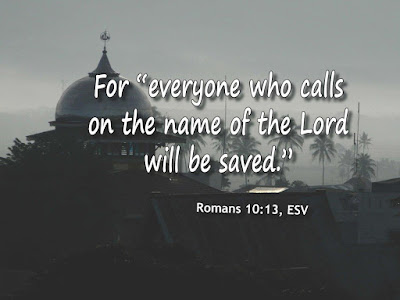This Riau Malay man was tending a shop that sold Muslim
clothing. The hats in the foreground are called peci [peh-CHEE]. It is the national hat in Indonesia, and it’s a
hat strongly connected with the Muslim religion. Those who wear a white peci are supposed to have already been
on the pilgrimage to Mecca called the hajj.
Those who wear a peci are often seen
as being better, more holy people.
Jesus warned about people who make a display of their
righteousness in Matthew 23:1-7. True holiness is not a matter of what you wear
or how you appear. True holiness is revealed by deeds and actions, but is
rooted in something deeper. Those who put on a show to be seen by others are
often the very ones whose life is less than exemplary. They preach, but they
don’t practice. Such people are hypocrites. Every religious group has their
share of this type of person, because religion alone doesn’t make anyone right
with God. It doesn’t make anyone holy.
Many Muslims will admit that they know people who have been
on the hajj, wear the white peci, but have lives that are far from
holy. They sometimes get drunk, gamble, visit prostitutes, and cheat in
business; their lives are a mockery of what the white peci is supposed to represent. This is not universally true, but it
happens often enough that most people in Sumatra have a name of someone they
know to go along with the story of being a religious hypocrite. But even the
very best representative of wearing the white peci in a worthy manner is still far short of the righteousness of
God.
We’d all agree that holiness is more than just wearing a
special hat, but what is the essence of true holiness? Paul suggests that true
righteousness does not come through works of the law, but by faith in Jesus
Christ. This is universally necessary because everyone falls short of God’s
perfect standard (Romans 3:20-25). To the Philippians Paul shares that
everything else is garbage compared with the surpassing goodness of being found
in Jesus, for in Jesus alone mankind can receive true righteousness or holiness
that is by faith (Philippians 3:8-9). As Paul reminded the Ephesians, this
faith that imparts salvation and holiness is a gift of God and leaves mankind
no room for boasting other than in Christ (Ephesians 2:8-9).
Many people prefer to wear the hat than to humbly admit
their sin and receive God’s gift of forgiveness through the perfect sacrifice
of Jesus, the Lamb of God. Anyone who truly receives this gift will not only be
saved, but will be transformed. This is God’s work and it is marvelous to
behold!
Pray for those on
Sumatra, who are trusting in the good deeds that the white hat is supposed to
represent, to see the futility of salvation and holiness by works.
Pray for spiritually
blind eyes on Sumatra to be opened to see Jesus lifted up so that all the
peoples of Sumatra will be drawn to Him.
Pray for humility
on Sumatra that is willing to take the place of a helpless sinner in order to
receive the gift of righteousness and salvation that is in Christ alone.









